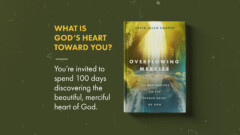If you are a Christian (and maybe even if you’re not) you’ve probably heard of “love languages.” I believe love languages can be both helpful and unhelpful depending how we use them. In this video I try to explain where they are helpful and where perhaps they aren’t. Here it is in Facebook and YouTube formats, followed by a transcript.
Rush Transcript
Welcome to another edition of Three Minute Thursdays, where I try to say something important, maybe even helpful, about a topic that’s of interest to Christians. This week’s topic is love languages, but before we to that, this video is made possible by Missional Wear. To learn about their great line of products and apparel for the holiday season, visit MissionalWear.com/Challies.
Now, let’s get three minutes on the clock, and here we go. If you’re a Christian, you’ve probably heard of love languages. A number of years ago, the author Gary Chapman wrote a book called The Five Love Languages, and here’s the book in a nutshell. Each one of us has a love tank that’s continually running empty. If you love me, what you need to do, is find out how to fill that love tank.
The way you do that is by learning my love language, and speaking that love language. It may be acts of service. It may be physical touch. There’s a number of different languages. What you need to do, is study me, and learn to speak that language, and that will be you showing love for me.
Now, in many ways that is helpful, however, I think there’s a couple flaws that we need to point out. Once we see those flaws, we can learn how to use these languages even better. Here are the flaws. The first one is that love languages may actually simply mask selfishness. It’s possible that I am actually using a love language that you appreciate, in order to manipulate you, so you give me love.
In other words, I will speak your language so that you speak mine, or I will speak your language to the degree or the extent that you speak mine. This may actually be a kind of back and forth, that we’ve negotiated that we will speak each other’s languages so honestly, primarily, we can feed our own desire to be loved.
Not only that, but love languages really aren’t even a thing, biblically. They’re not love languages, they’re love desires. These languages simply show how I desire to be loved. As we look at the Bible, we know I can’t trust my desires. I’m a sinful person. My desires are deeply flawed, because I myself am deeply flawed. My desires may simply point to my idols; those things I’m convinced that unless I have this, I cannot be happy, I cannot be joyful.
We need to be careful of this when we speak about love languages. So how do we use love languages well? Well, first we use them to point us to the variety of ways there are to be loved. If you have five children, chances are you’ve got five people who like to be loved in different ways. There are many ways we can give love, many ways we can receive love, and that’s amazing.
God has made us to be different, and it’s healthy, and it’s good, and it’s wonderful to explore the variety of ways that we can love and be loved. The second way to redeem love languages, and I think this is the most important of all, is to look at another person and understand, how does that person want to be loved? And then turn it around, and say, “Well, that’s exactly the way that person is most likely to love me.”
If that person loves physical touch, that person will touch me as a sign of love. Even if it means nothing to me, I need to learn to receive that as love. You see, so we’re not primarily talking here about how to give love to one another, but how to receive love from one another. Do you see how we’ve turned them around?
Now, how do I know that love languages are flawed but can be redeemed? Because Jesus Christ did not speak the language I wanted, He spoke the language I needed. That is the heart of the gospel. I wanted Him to speak in all sorts of languages. He spoke in the language I needed most, that proves to me I cannot trust what I want. Instead, I always, always need to look to Him and to His word. That’s another edition of Three Minute Thursdays. I hope you found it helpful.
(Most of what I say is loosely based on what David Powlison says in this excellent article.)










